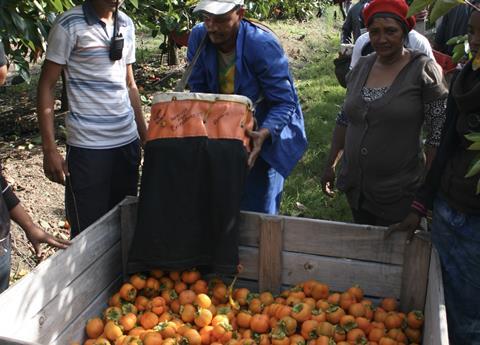Young industry fails as trees are removed and replaced with commodity categories
More than 20 years ago the southern regions in South Africa were chosen as the ideal place in the Southern Hemisphere to establish a counter-seasonal Sharon fruit export business, but now the dream of achieving that has been abandoned.

Sharon fruit is a persimmon that has to be handled and ripened in a very specific way, and was seen as a fruit with great promise in South Africa.
The country’s Sharon fruit business was founded more than 20 years ago by Israeli interests in partnership with South Africa’s Industrial Development Corporation (IDC).
It involved planting orchards and building a modern pack house at Buffeljagsrivier near Swellendam in the Southern Cape.
Growers across the Southern, Eastern and Western Cape joined in the quest to get ‘a piece of the cake’, which normally happens when new fruits and industries arrive and growers look for opportunities to escape the commodity business.
However, two years ago, the central Arisa packhouse at Buffeljagsrivier was sold to the ANB Investment group and has been turned into a full-time packhouse for its fast growing citrus interest in the area.
During the past year the last exclusive orchards on two Sharon fruit farms at Buffeljagsrivier were sold, the trees removed, probably to be replaced by other products.
Serious mistakes were made by growers who planted Sharon fruit in areas they should not have done so.
As far as Fruitnet can establish, there are now only two farms at Bonnievale still producing the fruit. The harvests will be modest, hardly enough to do any marketing or exporting.
At one point, the Sharon fruit industry grabbed the imagination of consumers in South Africa, and a successful export business provided fruit to Germany, the UK, parts of North America, the Middle East and Asia.
In South Africa Sharon fruit was warmly received by consumers during the April-June marketing period, with a particularly visible presence at the country’s fresh produce markets.
From there fruit made an impact in the informal and street markets in the northern regions. It was also exported to Southern African countries, where consumers favoured the sweet taste of the fruit.
Sharon Fruit also became the declared ‘favourite fruit’ of the late Archbishop Desmond Tutu, who always received the first carton of the season directly from the packhouse.
Fruit was also donated each year to a number of Tutu Charities where they were distributed to disadvantaged people.
The original concept was for the establishment of a worker trust where beneficiaries would have received shareholding as investments funds repaid to the IDC from profits.
The workers at the Arisa packhouse would perhaps not have shed too many tears at the departure of Sharon fruit from the valleys of the Southern Cape.
Arisa now packs large volumes of citrus and one assumes that employees now have work over much longer periods.
In the process another niche industry in South Africa is gone, but the bigger industries, the commodity businesses, endure and expand rapidly.



